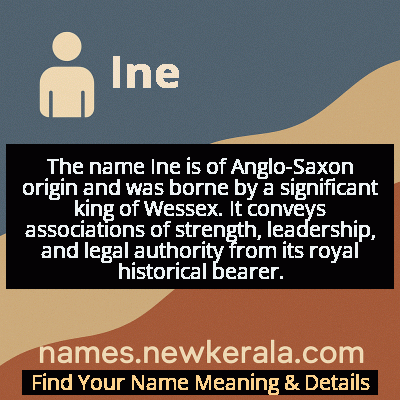Ine Name Meaning & Details
Origin, Popularity, Numerology Analysis & Name Meaning of Ine
Discover the origin, meaning, and cultural significance of the name INE. Delve into its historical roots and explore the lasting impact it has had on communities and traditions.
Name
Ine
Gender
Male
Origin
Anglo
Lucky Number
1
Meaning of the Name - Ine
The name Ine is of Anglo-Saxon origin and was borne by a significant king of Wessex. It conveys associations of strength, leadership, and legal authority from its royal historical bearer.
Ine - Complete Numerology Analysis
Your Numerology Number
Based on Pythagorean Numerology System
Ruling Planet
Sun
Positive Nature
Leaders, ambitious, highly driven, self-reliant, innovative.
Negative Traits
Overly aggressive, domineering, impatient, selfish.
Lucky Colours
Red, orange, gold.
Lucky Days
Sunday.
Lucky Stones
Ruby, garnet.
Harmony Numbers
2, 3, 9.
Best Suited Professions
Entrepreneurs, managers, engineers.
What People Like About You
Courage, determination, leadership.
Famous People Named Ine
Ine of Wessex
King
Ruled Wessex 689-726, established early English law code, founded Sherborne Abbey
Saint Ine
Religious Leader
Abdicated kingship to pilgrimage in Rome, venerated as saint in Catholic and Anglican traditions
Ine the Lawgiver
Monarch
Created comprehensive legal code influencing English common law development
Name Variations & International Equivalents
Click on blue names to explore their detailed meanings. Gray names with will be available soon.
Cultural & Historical Significance
Ine's reign marked a crucial period of consolidation for the Kingdom of Wessex, which would eventually become the dominant power in England. His decision to abdicate and pilgrimage to Rome added a layer of spiritual significance to his legacy, making him one of the few Anglo-Saxon kings venerated as a saint. The name thus embodies both temporal power and spiritual devotion in early English history, representing the ideal of Christian kingship that would dominate medieval European political thought.
Extended Personality Analysis
Individuals named Ine are typically perceived as strong-willed, authoritative, and principled, reflecting the historical king's legacy as a lawgiver and ruler. They often exhibit natural leadership qualities, combined with a deep sense of responsibility and commitment to established principles. Like their namesake, they tend to be strategic thinkers who value order and structure, yet possess the wisdom to know when to step away from power for higher purposes. There's often a blend of practical governance with spiritual depth, creating individuals who balance worldly success with inner reflection.
The name suggests someone who builds lasting institutions rather than seeking temporary glory, with a focus on creating systems that endure beyond their personal tenure. This combination of strength and spirituality makes Ine-named individuals particularly suited for roles requiring both decisive action and ethical consideration. They are often seen as traditional yet innovative, respecting established customs while recognizing when change is necessary for progress. The historical association with law-giving also implies a personality that values justice, fairness, and the establishment of clear guidelines for communal living.
Modern Usage & Popularity
In contemporary times, the name Ine remains quite rare and is primarily used by families with strong connections to English history or Anglo-Saxon heritage. It has never achieved widespread popularity in modern naming trends, maintaining its status as a distinctive historical name. Occasionally, it appears in academic or historical circles where parents seek names with deep English roots. The name's usage has seen minor revivals during periods of increased interest in early English history, but it remains outside the top 1000 names in English-speaking countries. Its rarity makes it an appealing choice for parents seeking a unique name with substantial historical weight and royal connections without being overly common or trendy.
Symbolic & Spiritual Meanings
Symbolically, the name Ine represents the foundation of law and order, drawing from King Ine's establishment of one of England's earliest legal codes. It embodies the transition from tribal warrior culture to organized monarchy and the integration of Christian values with traditional Germanic leadership. The name carries connotations of righteous authority, spiritual pilgrimage, and the wisdom to know when to wield power and when to relinquish it for higher purposes. It symbolizes the bridge between ancient traditions and emerging civilization, representing both the strength to rule and the humility to serve. The dual nature of King Ine's legacy—as both a powerful monarch and a religious pilgrim—gives the name rich symbolic depth, suggesting a life journey that balances worldly achievement with spiritual growth and ultimate transcendence.

